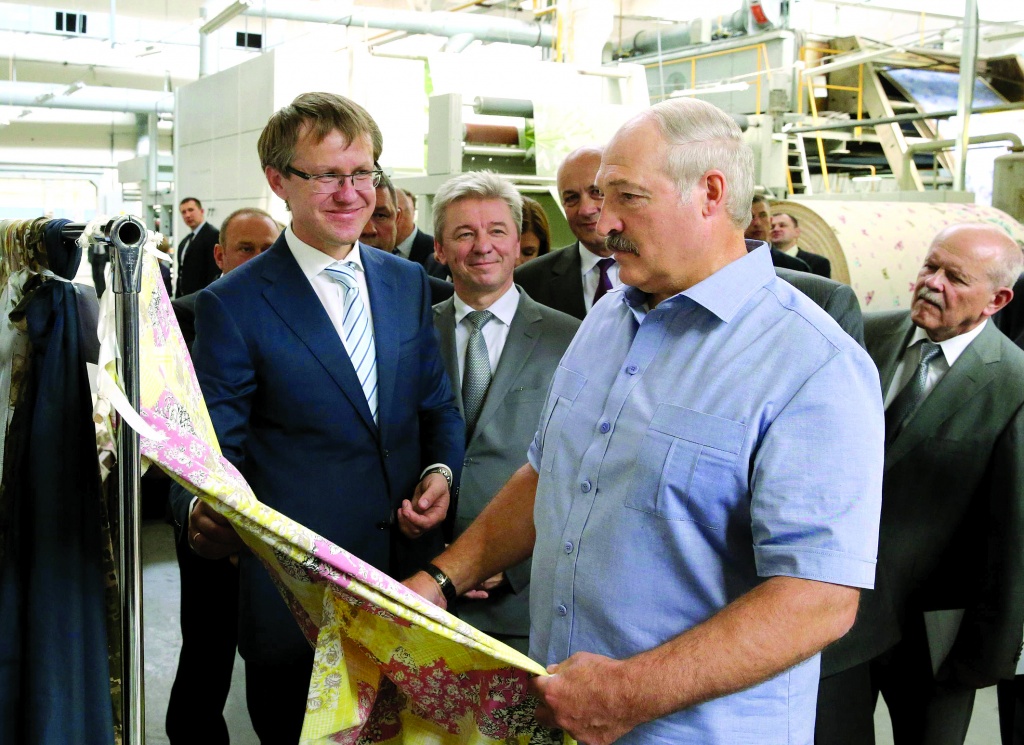Within the next 1-2 years, Bellegprom Concern plans to achieve enough volumes of production to completely meet domestic textile needs. These are ambitious plans, especially considering competition from foreign manufacturers. However, the imminent completion of three large modernisation projects gives the Concern grounds for optimism.

During visit to Baranovichi Cotton Production Association JSC
A full production cycle would increase the competitiveness of our goods. One such modernised facility is Baranovichi Cotton Production Association, whose share of the cotton fabric market now exceeds that held during Soviet times (within the post-Soviet space).
During his working trip to the Brest Region, the President visited the enterprise. It wasn’t the first trip made by Mr. Lukashenko but it may have been the most memorable, incorporating much inspection behind the scenes. The President broke away from the pre-planned route to examine several workshops and to chat unexpectedly to a female employee. Director General Ivan Turchak was also placed ‘on the spot’ in answering questions.
The essence of the conversation could not be totally overheard, due to the steady hum of machinery, but Mr. Lukashenko’s conversations weren’t for the benefit of journalists. In speaking, later, to the whole workforce, he emphasised the need to reduce prime costs and expand export supplies; the same is true for all enterprises, including this one. Moreover, he underlined the need to make efficient use of the newly modernised facilities. He noted, “Focus on prime costs. According to my calculations, you need to reduce these by another 7-10 percent. It’s bad that half of your facilities aren’t being used.”
Baranovichi Cotton Production Association is prioritising continuous technical re-equipment, the launch of technical innovations and the mastering of progressive technologies. Preliminary results speak for themselves: its share of the domestic bed-linen market increased from 15 percent in 2009 to 46 percent in 2015. By 2020, this should reach 62 percent.
In the first seven months of this year, its profit reached $5.7m, and should increase to $12m by the end of the year, exceeding $60m by 2016.
Mr. Lukashenko expressed confidence in Belarus’ economic situation improving in 2016, saying, “We need to conduct ourselves ‘as normal’ this year, and see how the situation appears by the year’s end. I’m sure we’ll start to see ourselves emerging from this situation next year; at least, we haven’t collapsed, as others have.”
The enterprise’s employees raised their concerns regarding the company’s ability to repay its loans promptly (as used for modernisation). To their pleasure, Mr. Lukashenko promised to consider extending the repayment schedule.
WORD-FOR-WORD
Chatting to the labour collective, the President tackled a range of important topics:
On the national currency
We won’t artificially restrain the exchange rate of the national currency as, if we did so, to keep down inflation, we’d be forced to devalue the national currency by 30 percent in one go.
Kazakhstan and Russia recently did so, but we did this earlier, to avoid using up our gold-and-currency reserves. It’s good that gold prices are on the rise since we have about 30 tonnes of gold. This is why we’re sticking to a floating rate policy through these difficult times.
On prices for consumer goods
We’re keeping an eye on prices. If we try to keep them down, market supply will drop. Yes, there is some volatility, some movement. However, I swear to you that we’re doing nothing to restrain or bolster or weaken the national currency. If more foreign currency is available, the exchange rate will fall. If demand is high, then foreign currency will be in short supply. You know what will happen. Let’s focus on buying domestic products and spending our vacations in Belarus; keep foreign currency inside our country. Don’t run from one currency exchange office to another. You’re just creating unnecessary problems.
On the necessity of preserving stability
Previously, it chilled me to see the currency exchange rates change; however, I’m now more worried about something else. We need to avoid destabilising the situation in the country. War is going on in the world; the most vital thing is to avoid such trouble touching us.
On the retirement age
We haven’t raised the issue. I’ve previously pointed out that the retirement age in Belarus should have been increased long ago. Pensions are not high in Belarus, due to an uneven share between those working and those in retirement. We are overburdening our children. If you want to see a particular ratio of pensioners to those employed, we’ll do so, but pensions will be lower. So, we’re not tackling the retirement age.
On housing construction
The practice of concessional lending will continue. If there’s more money available, we’ll allocate more for lending. Today’s situation isn’t that favourable. We’d be lucky if we managed to keep lending volumes as they are today. We need to build more rental housing to solve this issue. The entire world is moving in this direction.
On overcoming the consequences of the world crisis
The current global situation is difficult: soap bubbles created in the world economy are starting to blow out, destroying stock markets and devaluing national currencies. It is a financial war. It is an economic war where we don’t have to win and we don’t need to defeat anybody. What we need is to keep what’s ours and to hold on, to endure through this period.
By Vasily Kharitonov











